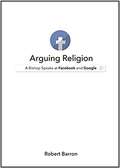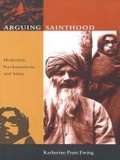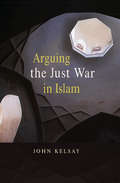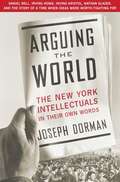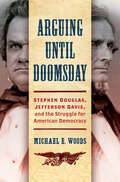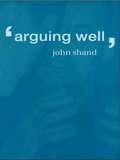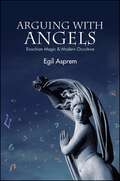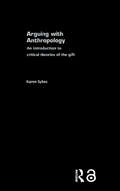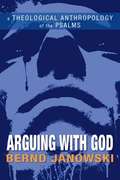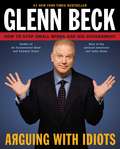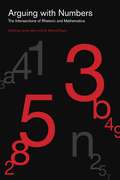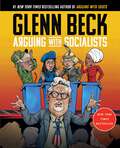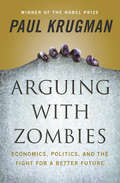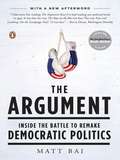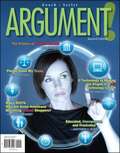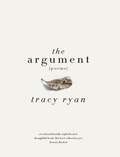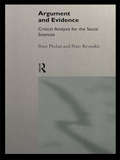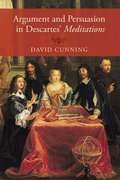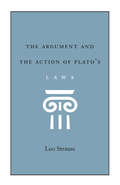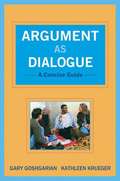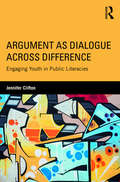- Table View
- List View
Arguing Religion: A Bishop Speaks at Facebook and Google
by Robert BarronEvery day, millions of people fight about religion. Whether with friends, family, or on social media, we expend lots of energy, lots of sharp words, and lots of strong feelings. But very few know how to have a good religious argument a rational, respectful, and productive exchange of differing views. <P><P> Bishop Robert Barron, one of the leading Catholic figures in the world and among the most active on social media, has enjoyed thousands of fruitful religious arguments. In this book based on talks delivered at Facebook and Google, he explains why religion at its best opens up the searching mind, and how we all believer and unbeliever alike can share better discussions about God.
Arguing Sainthood: Modernity, Psychoanalysis, and Islam
by Katherine Pratt EwingIn Arguing Sainthood, Katherine Pratt Ewing examines Sufi religious meanings and practices in Pakistan and their relation to the Westernizing influences of modernity and the shaping of the postcolonial self. Using both anthropological fieldwork and psychoanalytic theory to critically reinterpret theories of subjectivity, Ewing examines the production of identity in the context of a complex social field of conflicting ideologies and interests.Ewing critiques Eurocentric cultural theorists and Orientalist discourse while also taking issue with expatriate postcolonial thinkers Homi Bhabha and Gayatri Spivak. She challenges the notion of a monolithic Islamic modernity in order to explore the lived realities of individuals, particularly those of Pakistani saints and their followers. By examining the continuities between current Sufi practices and earlier popular practices in the Muslim world, Ewing identifies in the Sufi tradition a reflexive, critical consciousness that has usually been associated with the modern subject. Drawing on her training in clinical and theoretical psychoanalysis as well as her anthropological fieldwork in Lahore, Pakistan, Ewing argues for the value of Lacan in anthropology as she provides the basis for retheorizing postcolonial studies.
Arguing the Just War in Islam
by John KelsayJihad, with its many terrifying associations, is a term widely used today, though its meaning is poorly grasped. Few people understand the circumstances requiring a jihad, or "holy" war, or how Islamic militants justify their violent actions within the framework of the religious tradition of Islam. How Islam, with more than one billion followers, interprets jihad and establishes its precepts has become a critical issue for both the Muslim and the non-Muslim world. John Kelsay's timely and important work focuses on jihad of the sword in Islamic thought, history, and culture. Making use of original sources, Kelsay delves into the tradition of shari'a--Islamic jurisprudence and reasoning--and shows how it defines jihad as the Islamic analogue of the Western "just" war. He traces the arguments of thinkers over the centuries who have debated the legitimacy of war through appeals to shari'a reasoning. He brings us up to the present and demonstrates how contemporary Muslims across the political spectrum continue this quest for a realistic ethics of war within the Islamic tradition. Arguing the Just War in Islam provides a systematic account of how Islam's central texts interpret jihad, guiding us through the historical precedents and Qur'anic sources upon which today's claims to doctrinal truth and legitimate authority are made. In illuminating the broad spectrum of Islam's moral considerations of the just war, Kelsay helps Muslims and non-Muslims alike make sense of the possibilities for future war and peace.
Arguing the World
by Joseph DormanFrom cafeterias to cocktail parties to the pages of influential journals of opinion, few groups of friends have argued ideas so passionately and so publicly as the writers and critics known as the New York intellectuals. A brilliantly contentious circle of thinkers, they wielded enormous influence in the second half of the twentieth century through their championing of cultural modernism and their critique of Soviet totalitarianism. Arguing the World is a portrait of four of the leading members of the group in their own words, based on the extensive interviews that formed the basis for Joseph Dorman's acclaimed film of the same name, which New York magazine named in 1999 as the Best New York Documentary. The political essayist Irving Kristol, the literary critic Irving Howe, and the sociologists Daniel Bell and Nathan Glazer are brought into sharp focus in a vivid account of one of the century's great intellectual communities. In this wide-ranging oral history, Dorman documents the lifelong political arguments of these men, from their working-class beginnings to their rise to prominence in the years following World War II, particularly through their contributions to magazines and journals like Partisan Review and Com-mentary. From the advent of the Cold War and McCarthyism, to the rise of the New Left on college campuses in the sixties, to the emergence of neoconservatism in the seventies and eighties, the group's disagreements grew more heated and at times more personal. Driven apart by their responses to these historic events, in later life the four found themselves increasingly at odds with one another. Kristol became influential in America's resurgent conservative movement and Glazer made a name for himself as a forceful critic of liberal social policy, while Bell fought to defend a besieged liberalism. Until his death in 1993, Irving Howe remained an unapologetic voice of the radical left. Weaving personal reminiscences from these towering figures with those of their friends and foes, Arguing the World opens a new window on the social and intellectual history of twentieth-century America.
Arguing to Solve a Mystery
by Meghan Comstock Andrew Falk Emily Gibson Tessaly JenNIMAC-sourced textbook
Arguing until Doomsday: Stephen Douglas, Jefferson Davis, and the Struggle for American Democracy (Civil War America)
by Michael E. WoodsAs the sectional crisis gripped the United States, the rancor increasingly spread to the halls of Congress. Preston Brooks's frenzied assault on Charles Sumner was perhaps the most notorious evidence of the dangerous divide between proslavery Democrats and the new antislavery Republican Party. But as disunion loomed, rifts within the majority Democratic Party were every bit as consequential. And nowhere was the fracture more apparent than in the raging debates between Illinois's Stephen Douglas and Mississippi's Jefferson Davis. As leaders of the Democrats' northern and southern factions before the Civil War, their passionate conflict of words and ideas has been overshadowed by their opposition to Abraham Lincoln. But here, weaving together biography and political history, Michael E. Woods restores Davis and Douglas's fatefully entwined lives and careers to the center of the Civil War era. Operating on personal, partisan, and national levels, Woods traces the deep roots of Democrats' internal strife, with fault lines drawn around fundamental questions of property rights and majority rule. Neither belief in white supremacy nor expansionist zeal could reconcile Douglas and Davis's factions as their constituents formed their own lines in the proverbial soil of westward expansion. The first major reinterpretation of the Democratic Party's internal schism in more than a generation, Arguing until Doomsday shows how two leading antebellum politicians ultimately shattered their party and hastened the coming of the Civil War.
Arguing Well
by John ShandArguing Well is a lucid introduction to the nature of good reasoning, how to test and construct successful arguments. It assumes no prior knowledge of logic or philosophy. The book includes an introduction to basic symbolic logic. Arguing Well introduces and explains: * The nature and importance of arguments * What to look for in deciding whether arguments succeed or fail * How to construct good arguments * How to make it more certain that we reason when we should The book is ideal for any student embarking on academic study where presenting arguments are what matters most; in fact, for all people who want to understand the nature and importance of good reasoning and awaken their ability to argue well.
Arguing with Angels: Enochian Magic and Modern Occulture (SUNY series in Western Esoteric Traditions)
by Egil AspremThis fascinating work explores John Dee's Enochian magic and the history of its reception. Dee (1527–1608/9), an accomplished natural philosopher and member of Queen Elizabeth I's court, was also an esoteric researcher whose diaries detail years of conversations with angels achieved with the aid of crystal-gazer Edward Kelley. His Enochian magic offers a method for contacting angels and demons based on secrets found in the apocryphal Book of Enoch.Examining this magical system from its Renaissance origins to present day occultism, Egil Asprem shows how the reception of Dee's magic is replete with struggles to construct and negotiate authoritative interpretational frameworks for doing magic. Arguing with Angels offers a novel, nuanced approach to questions about how ritual magic has survived the advent of modernity and demonstrates the ways in which modern culture has recreated magical discourse.
Arguing With Anthropology: An Introduction to Critical Theories of the Gift
by Karen SykesArguing with Anthropology is a fresh and wholly original guide to key elements in anthropology, which teaches the ability to think, write and argue critically. Using the classic 'question of the gift' as a master-issue for discussion, and drawing on a rich variety of Pacific and global ethnography, it provides a unique course in methods, aims, knowledge, and understanding. The book's highly original hypothetical approach takes gift-theory - the science of obligation and reciprocity - as the paradigm for a virtual enquiry which explores how the anthropological discipline has evolved historically, how it is applied in practice and how it can be argued with critically. By asking students to participate in projected situations and dilemmas, and in arguments about the form and nature of enquiry, it offers working practice of dealing with the obstacles and choices involved in anthropological study. * From an expert teacher whose methods are tried and tested* Comprehensive and fun course ideal for intermediate-level students* Clearly defines the functions of anthropology, and its key theories and arguments* Effectively teaches core study skills for exam success and progressive learning.
Arguing with God
by Bernd JanowskiThis is the first English translation of Bernd Janowski's incisive anthropological study of the Psalms, originally published in German in 2003 as Konfliktgespräche mit Gott. Eine Anthropologie der Psalmen (Neukirchener). Janowski begins with an introduction to Old Testament anthropology, concentrating on themes of being forsaken by God, enmity, legal difficulties, and sickness. Each chapter defines a problem and considers it in relation to anthropological insights from related fields of study and a thematically relevant example from the Psalms, including how a central aspect of this Psalm is explored in other Old Testament or Ancient Near Eastern texts. Each chapter concludes with an "Anthropological Keyword," which explores especially important words and phrases in the Psalms. The book also includes reflections on reading the Psalms from a New Testament perspective, focusing on themes of transience, praising God, salvation from death, and trust in God. Janowski's study demonstrates how the Psalms have important theological implications and ultimately help us to understand what it means to be human.
Arguing with Idiots
by Kevin Balfe Glenn BeckFUNNY. FRIGHTENING. TRUE. The #1 New York Times bestseller that gives you the right answers when idiots leave you speechless! It happens to all of us: You're minding your own business, when some idiot* informs you that guns are evil, the Prius will save the planet, or the rich have to finally start paying their fair share of taxes. Just go away! you think to yourself--but they only get more obnoxious. Your heart rate quickens. You start to sweat. But never fear, for Glenn Beck has stumbled upon the secret formula to winning arguments against people with big mouths and small minds: knowing the facts. And this book is full of them. The next time your Idiot Friends tell you how gun control prevents gun violence, you'll tell them all about England's handgun ban (see page 53). When they insist that we should copy the UK's health-care system, you'll recount the horrifying facts you read on page 244. And the next time you hear how produce prices will skyrocket without illegal workers, you'll have the perfect rebuttal (from page 139). Armed with the ultimate weapon--the truth--you can now tolerate (and who knows, maybe even enjoy?) your encounters with idiots everywhere! *Idiots can't be identified through voting records; look instead for people who hide behind stereotypes, embrace partisanship, and believe that bumper sticker slogans are a substitute for common sense.
Arguing with Numbers: The Intersections of Rhetoric and Mathematics (RSA Series in Transdisciplinary Rhetoric #16)
by James Wynn G. Mitchell ReyesAs discrete fields of inquiry, rhetoric and mathematics have long been considered antithetical to each other. That is, if mathematics explains or describes the phenomena it studies with certainty, persuasion is not needed. This volume calls into question the view that mathematics is free of rhetoric. Through nine studies of the intersections between these two disciplines, Arguing with Numbers shows that mathematics is in fact deeply rhetorical. Using rhetoric as a lens to analyze mathematically based arguments in public policy, political and economic theory, and even literature, the essays in this volume reveal how mathematics influences the values and beliefs with which we assess the world and make decisions and how our worldviews influence the kinds of mathematical instruments we construct and accept. In addition, contributors examine how concepts of rhetoric—such as analogy and visuality—have been employed in mathematical and scientific reasoning, including in the theorems of mathematical physicists and the geometrical diagramming of natural scientists. Challenging academic orthodoxy, these scholars reject a math-equals-truth reduction in favor of a more constructivist theory of mathematics as dynamic, evolving, and powerfully persuasive. By bringing these disparate lines of inquiry into conversation with one another, Arguing with Numbers provides inspiration to students, established scholars, and anyone inside or outside rhetorical studies who might be interested in exploring the intersections between the two disciplines.In addition to the editors, the contributors to this volume are Catherine Chaput, Crystal Broch Colombini, Nathan Crick, Michael Dreher, Jeanne Fahnestock, Andrew C. Jones, Joseph Little, and Edward Schiappa.
Arguing with Numbers: The Intersections of Rhetoric and Mathematics (RSA Series in Transdisciplinary Rhetoric)
by James Wynn G. Mitchell ReyesAs discrete fields of inquiry, rhetoric and mathematics have long been considered antithetical to each other. That is, if mathematics explains or describes the phenomena it studies with certainty, persuasion is not needed. This volume calls into question the view that mathematics is free of rhetoric. Through nine studies of the intersections between these two disciplines, Arguing with Numbers shows that mathematics is in fact deeply rhetorical. Using rhetoric as a lens to analyze mathematically based arguments in public policy, political and economic theory, and even literature, the essays in this volume reveal how mathematics influences the values and beliefs with which we assess the world and make decisions and how our worldviews influence the kinds of mathematical instruments we construct and accept. In addition, contributors examine how concepts of rhetoric—such as analogy and visuality—have been employed in mathematical and scientific reasoning, including in the theorems of mathematical physicists and the geometrical diagramming of natural scientists. Challenging academic orthodoxy, these scholars reject a math-equals-truth reduction in favor of a more constructivist theory of mathematics as dynamic, evolving, and powerfully persuasive. By bringing these disparate lines of inquiry into conversation with one another, Arguing with Numbers provides inspiration to students, established scholars, and anyone inside or outside rhetorical studies who might be interested in exploring the intersections between the two disciplines.In addition to the editors, the contributors to this volume are Catherine Chaput, Crystal Broch Colombini, Nathan Crick, Michael Dreher, Jeanne Fahnestock, Andrew C. Jones, Joseph Little, and Edward Schiappa.
Arguing With People
by Michael A. GilbertArguing with People brings developments from the field of Argumentation Theory to bear on critical thinking in a clear and accessible way. This book expands the critical thinking toolkit, and shows how those tools can be applied in the hurly-burly of everyday arguing. Gilbert emphasizes the importance of understanding real arguments, understanding just who you are arguing with, and knowing how to use that information for successful argumentation. Interesting examples and partner exercises are provided to demonstrate tangible ways in which the book's lessons can be applied.
Arguing with Socialists
by Glenn BeckIn Arguing With Socialists, New York Times bestselling author Glenn Beck arms readers to the teeth with information necessary to debunk the socialist arguments that have once again become popular, and proves that the free market is the only way to go. <P><P> With his trademark humor, Beck lampoons the resurgence of this bankrupt leftist philosophy with thousands of stories, facts, arguments and easy-to-understand graphics for anyone who is willing to ask the hard questions. He shows that this new shiny socialism is just the same as the old one: a costly and dangerous failure that leaves desperation, poverty, and bodies in its wake. <P><P><b>A New York Times Bestseller</b>
Arguing with Zombies: Economics, Politics, And The Fight For A Better America
by Paul KrugmanAn accessible, compelling introduction to today’s major policy issues from the New York Times columnist, best-selling author, and Nobel prize–winning economist Paul Krugman. <P><P>There is no better guide than Paul Krugman to basic economics, the ideas that animate much of our public policy. Likewise, there is no stronger foe of zombie economics, the misunderstandings that just won’t die. <P><P>In Arguing with Zombies, Krugman tackles many of these misunderstandings, taking stock of where the United States has come from and where it’s headed in a series of concise, digestible chapters. Drawn mainly from his popular New York Times column, they cover a wide range of issues, organized thematically and framed in the context of a wider debate. Explaining the complexities of health care, housing bubbles, tax reform, Social Security, and so much more with unrivaled clarity and precision, Arguing with Zombies is Krugman at the height of his powers. <P><P>Arguing with Zombies puts Krugman at the front of the debate in the 2020 election year and is an indispensable guide to two decades’ worth of political and economic discourse in the United States and around the globe. With quick, vivid sketches, Krugman turns his readers into intelligent consumers of the daily news and hands them the keys to unlock the concepts behind the greatest economic policy issues of our time. In doing so, he delivers an instant classic that can serve as a reference point for this and future generations. <P><P><b>A New York Times Bestseller</b>
The Argument
by Matt BaiWidely cited by journalists and bloggers as the man to read to understand the political races, New York Times Magazine writer Matt Bai has written a book about the Democratic Party that?s as riveting as it is timely and vital. The Argument takes readers to the front lines of the grassroots progressive movement that is seizing power from the party?s weakened D. C. establishment, capturing a colorful cast of donors and power brokers struggling to articulate a direction: an argument. The result is a fascinating, uniquely candid look at present-day politics. .
Argument!
by Erica Messenger John Gooch Dorothy U. SeylerARGUMENT! marries solid instruction in critical reading and analysis, argument, and research strategies with a visually engaging and dynamic design. ARGUMENT! teaches students how to read with a critical eye, how to think about and respond to the ideas of others, and ultimately how to craft their own effective, relevant, and engaging arguments. With ARGUMENT! students will learn how to acknowledge and respond to the complex arguments (both visual and textual) that exist all around them in addition to entering debates with their own strong and thoughtful voice.
The Argument
by Tracy RyanPoems of keen appraisal and survival, bound by a cohesive vision, form this collection, which features the work of Australian poet Tracy Ryan. Revealing the poet's preoccupation with mortality, this compilation deals with the cold cross-examiner death by responding with life.
Argument and Evidence: Critical Analysis for the Social Sciences
by Peter J. Phelan Peter J. ReynoldsPhelan and Reynolds' book is for anyone who needs to evaluate arguments and interpret evidence. It deals with the most fundamental aspects of academic study: * the ability to reason with ideas and evidence* to formulate arguments effectively* to appreciate the interplay between ideas and evidence in academic and media debateArgument and Evidence presents aspects of informal logic and statistical theory in a comprehensible way, enabling students to acquire skills in critical thinking which will outlast their undergraduate studies. Ideal as a companion for courses on methodology or study skills, Argument and Evidence will also be useful for other disciplines in the social sciences and humanities.
Argument And Persuasion In Descartes' Meditations
by David CunningDescartes' Meditations on First Philosophy has proven to be not only one of the canonical texts of Western philosophy, but also the site of a great deal of interpretive activity in scholarship on the history of early modern philosophy over the last two decades. David Cunning's monograph proposes a new interpretation, which is that from beginning to end the reasoning of the Meditations is the first-person reasoning of a thinker who starts from a confused non-Cartesian paradigm and moves slowly and awkwardly toward a grasp of just a few of the central theses of Descartes' system. The meditator of the Meditations is not a full-blown Cartesian at the start or middle or even the end of inquiry, and accordingly the Meditations is riddled with confusions throughout. Cunning argues that Descartes is trying to capture the kind of reasoning that a non-Cartesian would have to engage in to make the relevant epistemic progress, and that the Meditations rhetorically models that reasoning. He proposes that Descartes is reflecting on what happens in philosophical inquiry: we are unclear about something, we roam about using our existing concepts and intuitions, we abandon or revise some of these, and then eventually we come to see a result as clear that we did not see as clear before. Thus Cunning's fundamental insight is that Descartes is a teacher, and the reader a student. With that reading in mind, a significant number of the interpretive problems that arise in the Descartes literature dissolve when we make a distinction between the Cartesian and non-Cartesian elements of the Meditations, and a better understanding of surrounding texts is achieved as well. This important volume will be of great interest to scholars of early modern philosophy.
The Argument and the Action of Plato's Laws
by Leo StraussThe posthumous publication of The Argument and the Action of Plato's "Laws" was compiled shortly before the death of Leo Strauss in 1973. Strauss offers an insightful and instructive reading through careful probing of Plato's classic text. "Strauss's The Argument and the Action of Plato's 'Laws' reflects his interest in political thought, his dogged method of following the argument of the Laws step by step, and his vigorous defense of this dialogue's integrity in respect to the ideals of the Republic. "—Cross Currents "The unique characteristics of this commentary on the Laws reflect the care and precision which were the marks of Professor Strauss's efforts to understand the complex thoughts of other men. "—Allan D. Nelson, Canadian Journal of Political Science "Thorough and provocative, an important addition to Plato scholarship. "—Library Journal "The major purpose of the commentary is to provide a reading of the dialogue which displays its structural arrangement and the continuity of the argument. "—J. W. Dy, Bibliographical Bulletin of Philosophy "The reader of Strauss's book is indeed guided closely through the whole text. "— M. J. Silverthorne, The Humanities Association Review Leo Strauss (1899-1973) was the Robert Maynard Hutchins Distinguished Service Professor Emeritus of political science at the University of Chicago.
The Argument and the Action of Plato's Laws
by Leo StraussThe posthumous publication of The Argument and the Action of Plato's "Laws" was compiled shortly before the death of Leo Strauss in 1973. Strauss offers an insightful and instructive reading through careful probing of Plato's classic text. "Strauss's The Argument and the Action of Plato's 'Laws' reflects his interest in political thought, his dogged method of following the argument of the Laws step by step, and his vigorous defense of this dialogue's integrity in respect to the ideals of the Republic."—Cross Currents "The unique characteristics of this commentary on the Laws reflect the care and precision which were the marks of Professor Strauss's efforts to understand the complex thoughts of other men."—Allan D. Nelson, Canadian Journal of Political Science "Thorough and provocative, an important addition to Plato scholarship."—Library Journal "The major purpose of the commentary is to provide a reading of the dialogue which displays its structural arrangement and the continuity of the argument."—J. W. Dy, Bibliographical Bulletin of Philosophy "The reader of Strauss's book is indeed guided closely through the whole text."— M. J. Silverthorne, The Humanities Association Review Leo Strauss (1899-1973) was the Robert Maynard Hutchins Distinguished Service Professor Emeritus of political science at the University of Chicago.
Argument as Dialogue: A Concise Guide
by Gary Goshgarian Kathleen KruegerArgument as Dialogue is a concise and affordable guide to persuasive writing and research that treats argument as a process of dialogue and deliberation--the exchange of opinions and ideas--among people of different values and perspectives.
Argument as Dialogue Across Difference: Engaging Youth in Public Literacies
by Jennifer CliftonIn the spirit of models of argument starting with inquiry, this book starts with a question: What might it mean to teach argument in ways that open up spaces for change—changes of mind, changes of practice and policy, changes in ways of talking and relating? The author explores teaching argument in ways that take into account the complexities and pluralities young people face as they attempt to enact local and global citizenship with others who may reasonably disagree. The focus is foremost on social action—the hard, hopeful work of finding productive ways forward in contexts where people need to work together across difference to get something worthwhile done.
